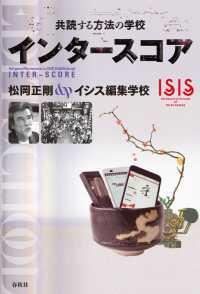- ホーム
- > 洋書
- > 英文書
- > Literary Criticism
Full Description
Aims to introduce a greater degree of theoretical rigor to the discipline of Japan studies as a whole.
Before Identity represents the first attempt to provide a comprehensive examination of the methodological ground of Japan studies. At its most basic level, the field presupposes the immediate empirical existence of an entity known as the "Japanese people" or "Japanese culture," from which it then carves out its various objects of inquiry. Richard F. Calichman attempts to show that this presupposition is itself ineluctably bound up with modern forms of knowledge formation, thereby enlarging the scope of what is meant by modernity. In this way, he aims to bring about a heightened level of theoretical-critical vigilance in the field.
Calichman explores the methodological commitments implied or expressed in the work of a range of writers and scholars-Murakami Haruki, Komori Yōichi, Harry Harootunian, Tomi Suzuki, Alan Tansman, and Dennis Washburn-and how such commitments have shaped and limited the field. If theoretical issues in Japan studies are not subjected to this sort of in-depth scrutiny, Calichman argues, then the field will continue to remain ghettoized relative to other disciplines in the humanities and social sciences, which have typically been more receptive to conceptual discourse. By showing that scholarly inquiry must begin not at the level of the object but rather at the more fundamental level of methodology, Calichman aims to introduce a greater degree of theoretical rigor to the discipline of Japan studies as a whole.
Contents
Acknowledgments
Introduction
1. Remembering Kafka: Between Murakami Haruki and Komori Yōichi
2. The Double Pull of History and Philosophy: Reading Harootunian
3. The Question of Subjectivity in North American Japanese Literary Studies
Coda Some Brief Remarks on Responsibility
Notes
Bibliography
Index






